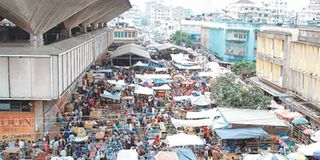Kariakoo Market grapples with serious challenges

A partial view of Kariakoo Market in Dar es Salaam. PHOTO|FILE
What you need to know:
- Top on the challenge list is outstanding tax arrears totaling Sh1.3 billion owed to the premier revenues body, the Tanzania Revenue Authority (TRA), as well as property tax (buildings).
Dar es Salaam. The Kariakoo Market Corporation (KMC) is facing a number of challenges that are limiting its planned expansion into new locations within the Dar es Salaam metropolis.
Top on the challenge list is outstanding tax arrears totaling Sh1.3 billion owed to the premier revenues body, the Tanzania Revenue Authority (TRA), as well as property tax (buildings).
This drawback looms large despite the fact that there have been some improvements in the corporation’s operations during the past few years – what with its revenues rising from Sh2.1 billion in the 2012/13 financial year to Sh3.6 billion in the current financial year, FY-2017/18.
Speaking to The Citizen in an exclusive interview, the KMC general manager, Mr Hetson Msalale, said the tax debt and the other challenges that the Corporation has been facing have put it in a difficulty situation to the extent that it has slowed its pace of development.
“The debt is genuine, as it is due to deductions that were not remitted to TRA. We are also supposed to pay property tax. So, we have to pay the taxes as there is no way out,” Mr Msalale frankly conceded.
Another challenge is that the Dar es Salaam city council (DCC), which was offered ownership of 51 per cent shares, has failed to pay for them – unlike the central government, which paid in full in 1978 for all the 49 per cent shares it holds through the Treasury registrar.
According to information from the summary of a joint meeting led by the director of regional administration and local government in the President’s Office (PO-RALG) in 2016, it was revealed that DCC had not paid for its shares allegedly because it did provide Sh10.4 million for financing construction of the market – which is also on the Council’s land plot.
“The plot was valued at Sh11.8 million, and was previously owned by the city. Therefore, the total value of the city’s contribution to the central market is Sh22.2 million,” the summary report reads in part.
However, it was also explained that this procedure did not guarantee the city shareholding in the corporation because it did not follow the procedures for acquiring shares in the corporation.
Speaking on the matter, Mr Msalale said the city paid Sh20 million to the corporation in 2009 as capital, whereby the cash was deposited into the corporation’s savings account.
The Dar es Salaam city director, Spora Liana, said “we already have addressed the issue after holding a meeting at which we agreed that the cash was little compared to the land plot as capital, and the costs of putting up the market buildings. However, I must say that the corporation had some embezzlers, whom we have already dealt with.
“There was no crisis between the City and the Treasury, but there were some embezzlers who were fueling a crisis between the two organisations for reasons best known to themselves.”
The Ilala, Kinondoni and Temeke municipal councils within the City of Dar es Salaam have also been mentioned as another challenge faced by the Kariakoo Market Corporation for establishing municipal markets that conduct businesses similar to those being carried out by the Kariakoo central market. The councils are accused of enacting by-laws through their civic mandate that bar heavy duty vehicles from entering the city centre.
It is reported that the situation has caused the corporation – on which farmers from upcountry regions have depended as a market for their produce since 1974 when it was established – to become just another retail market.




